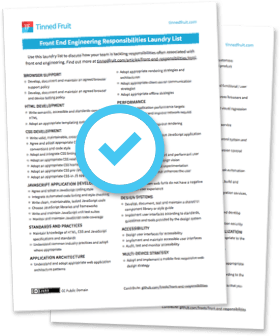Tinned Fruit Missives June 2017
I often feel that we developers spend too little energy and time contributing to the design process. Good product design demands effective use of the constraints and opportunities provided by the web platform. This knowledge is something that front-end developers in particular can contribute to a collaborative design process.
We should be looking beyond frameworks and tools optimised for developer happiness and efficiency. That outlook tends to reinforce the separation of development work from design work, which should feel troublesome to front-end developers. Instead, we need to apply our web platform knowledge to solving real user problems, informed by research and experimentation.
For me personally, getting heavily involved in an iterative design process can be the most rewarding part of the work. I know from experience that robotically producing implementations based on others’ instructions doesn’t have the same sense of achievement, no matter the cool tech or clever techniques that I used along the way.
All the best,
– Jim
Should Designers Code??? - Alan Cooper
https://medium.com/@MrAlanCooper/should-designers-code-f7b745b8cd03
Self-proclaimed ‘software alchemist’ and proper old-school user-centered design legend Alan Cooper presents a three-part argument on the age old question of whether designers should also code. tl;dr: No, they shouldn’t, except when they should. In the future when anyone asks my opinion on this topic I’ll just point them to this. The question I’d like more people to consider is ‘How best can developers engage in and contribute towards design?’
Beyond the Bubble: Real world performance - Ben Schwarz
https://building.calibreapp.com/beyond-the-bubble-real-world-performance-9c991dcd5342
A sharp reminder that most developers don’t have a clear picture of the circumstances of real-user network and device performance. Ben’s article gives some eye-popping insight into the explosion of cheaper data plans in India, and the implications for web application performance testing approaches. Routine performance testing on more ‘average’ devices should be a regular part of any development process, really. It often isn’t.
Internet Trends 2017 - Mary Meeker
http://www.kpcb.com/internet-trends
Annual required reading for anyone working anywhere near the internet in any capacity. I’ll admit, I’ve not made my way through all of this just yet, but it’s always packed full of remarkable insights.
A Unified Styling Language - Mark Dalgleish
https://medium.com/seek-blog/a-unified-styling-language-d0c208de2660
Do you feel icky about the idea of using JavaScript to author CSS? On the surface this trend goes against well-established best practices like progressive enhancement and separation of concerns. In this long, detailed and compelling article, Mark Dalgleish defends this emerging practice. The ecosystem of CSS-in-JS is young, and there are lots of competing and complementary approaches that will no doubt consolidate in the next year or two. I’m personally excited by the potential for these approaches to assist with progressively enhanced but rich application experiences that are currently far too challenging to implement.
Some other World Wide Web hyperlinks I have enjoyed this month
- Dual Track Development is not Duel Track - Jeff Patton
- A Love Letter to CSS - TJ Van Toll
- (Slides) Let There Be Peace on CSS - Cristiano Rastelli
- Pre-fabricated components - Tom Coleman
- Go Long on Web Components - Jani Tarvainen
- User Facing State - Scott O’Hara
- Chrome Won - Andreas Gal
- Re-architecting Airbnb’s Frontend - Adam Neary
- Why We Didn’t Use a Framework - Nick Gauthier
- Safety in Silos - John Cutler
- Five Factor Testing - Sarah Mei
Tinned Fruit Missives is a monthly newsletter about web product development and front-end practices published by Jim Newbery, an independent consultant from Edinburgh in Scotland.
I help growing web product companies with their front-end development strategy and implementation. Let’s talk!.
